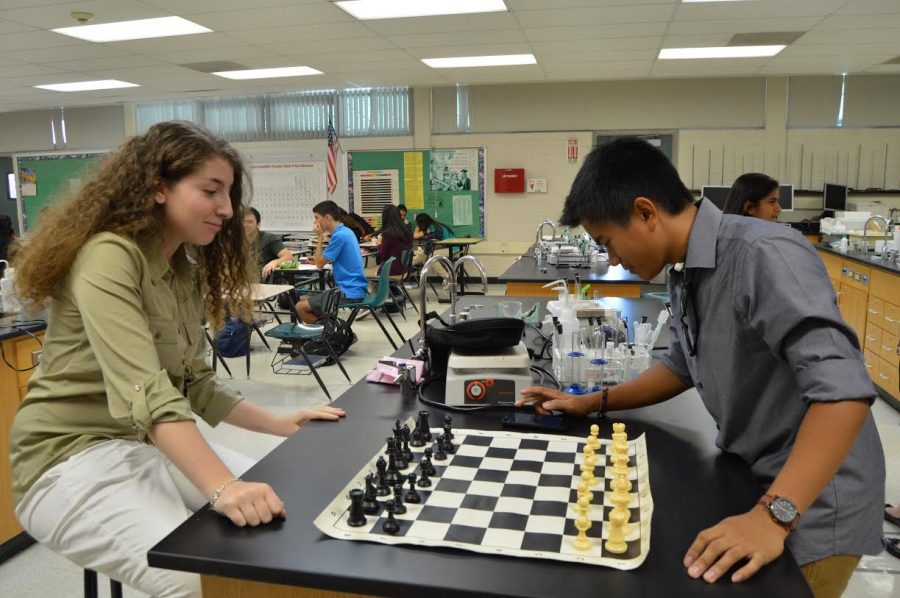Checking in with chess
Fast-paced world of chess provides academic and social benefits
October 24, 2014
Elizabeth Abramyan, playing with black pieces, and Joshua Valerio, playing with white, contemplate their next steps in their intense game of chess.
“Why would you do that?” asked senior Elizabeth Abramyan. “You’re clearly putting your bishop in danger. Try this,” Abramyan suggested to fellow senior and opponent chess player Joshua Valerio as she highlighted a better move for him during an impulsive lunch game.
According to the United States Chess Federation, chess originated from an Indian war game called Chatarung in 600 A.D. The game then spread to Europe thanks to Persian traders. Medieval chess players often began with tabiyas, moves that would usually crop up in the middle of a game. Tabiyas were utilized to try to quicken the pace of the game because besides being just a game, chess was also a way for people to socialize. In fact, founding father Benjamin Franklin, who made chess a part of American culture, would spend hours playing chess with beautiful women.
Yet chess is not just for socializing. Like any other sport, the world of chess is rife with competition and championships. Paul Morphy, who was born in 1837 in New Orleans, is seen as the first American to be unofficially declared a world chess champion in a time when there were no clearly established chess organizations. Other official world champions include Boris Spassky, Bobby Fischer and Garry Kasparov.
Although the rules of chess have undergone many changes and become more standardized, the gist of the game has stayed the same. There are two opposing sides warring with each other on the chessboard. For the players who are controlling the pieces, however, it is not a physical battle, but a battle of wits.
For Abramyan, the thought-provoking competition began with her father and brother when she was four years old. “I would love to play with them when dad came home,” she said. “My dad is really good at chess, but once I beat him. It felt like I had progressed.”
Abramyan is not the only chess player who associates the game with fond memories.
For Valerio, chess is forever associated with his late grandmother. “She taught me how to play when I was ten,” he said. “She taught me how to play, but my inspiration to keep playing is Garry Kasparov. He’s the chess champion who was defeated by Deep Blue, IBM’s chess-playing computer, in 1996.”
Now, with a firm grasp on the principles of chess, Valerio enjoys chess not just as a way to remember his grandmother, but also as a way to socialize, just like the players of the olden days. “Chess brings my friends together and adds a competitive spirit to our relationships.”

Joshua Valerio warily regards Abramyan’s plans as he prepares to move his knight.
Indeed, the game between Abramyan and Valerio was fiercely friendly. Even as the two ruthlessly attempted to check each other, their tips for each other were endless. Although they were technically opponents, they worked collaboratively to determine which move would be the best for each of them.
“If you put that knight there, then I’ll be able to check you,” said Valerio after Abramyan made her move. After his demonstration, she withdrew her piece and deeply contemplated other possible moves.
“Chess has taught me how to focus better,” said Abramyan, taking a break. “I have to anticipate [Valerio’s] moves and set up traps, while creating back-up plans for myself; both skills that I use in my everyday life now.”
Watching Abramyan and Valerio’s heated game from the side, chess club adviser Loussik Kassakhian provided more insight into this idea. “Chess makes the players more confident,” Kassakhian said. “And it gets them to help each other.”
Besides embedding social skills into its players, chess can also hone academic skills. “Chess is just one game,” Kassakhian said. “But it creates memory, analytical and strategizing skills.”
Kassakhian said that chess teaches people “what to think” rather than “how to think.” The abstract concepts in chess are made less abstract through continuous practice in which players develop critical thinking skills, and this thought process carries over to the players’ studies.
Most members of the All American Association (AAA) Chess Club of Glendale would agree. The nonprofit organization was founded by the father of Harry Keshishian, the club’s current managing coordinator, in 1981, to provide after-school enrichment sessions for children from Kindergarten through eighth grade based on a “proprietary curriculum.”
“Chess deals with abstract concepts, but not everyone is on the same playing field,” Keshishian said. “And that’s the real work: to help the kids who can’t grasp the ideas involved in chess.”
Keshishian strongly believes that there is a “correlation between chess and academics,” no matter what the subject is. “The more practice they have, the more they can think outside the box.”
The idea that chess promotes better performance in academics is not a communal idea, but a global one. According to EurasiaNet’s article “Armenia: Can Chess ‘Build the Country’s Future?’” by Marianna Grigoryan, the Armenian government has implemented a $485,000 program to make chess a mandatory subject in grades two, three and four.
“Look at Armenia,” Kassakhian said. “They teach chess classes because it’s another approach to success in education.”
Besides teaching critical thinking skills, chess can also have a direct impact on one’s education. For instance, Abramyan is creating a metallic chess set for her senior project. “I wanted to learn how to use CNC Lathe to make the set,” she said. “With this project, the creativity I learned because of chess is being manifested into a physical chess set.”
